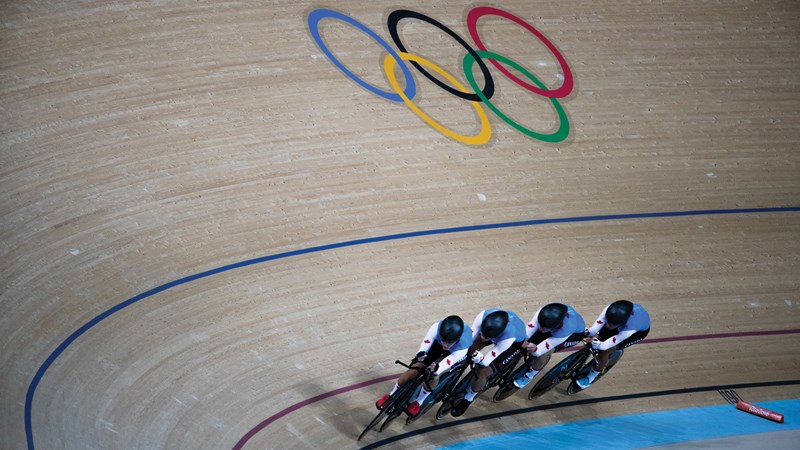You’ve decked the halls, you’ve rocked around the Christmas tree, you’ve even been good, for goodness sake – there’s nothing left this holiday season but to enjoy our annual look back at the top five North Shore sports stories of the year.
Olympic podiums, Stanley Cup finals, the backwaters of Eastern Tennessee – this year’s list takes us to some of the most special sports places on earth. We’ll start our list right at the top with our number 1 story, as chosen by the North Shore News sports editorial board. Grab your wassail and enjoy the show.
1. Simmerling earns bronze on a bike
West Vancouver’s Georgia Simmerling made history the moment her wheels started spinning during qualification for the women’s track cycling team pursuit at the Rio Olympics in August. With that, Simmerling became the first Canadian athlete ever to compete in three different sports in three different Games. In 2010 Simmerling competed in alpine skiing before switching over to ski cross for the 2014 Games.
She wasn’t there in Rio just for the historical footnote though – Simmerling and her teammates wanted hardware and they got it, blowing away New Zealand by nearly four seconds and setting a new Canadian record in the bronze-medal race.
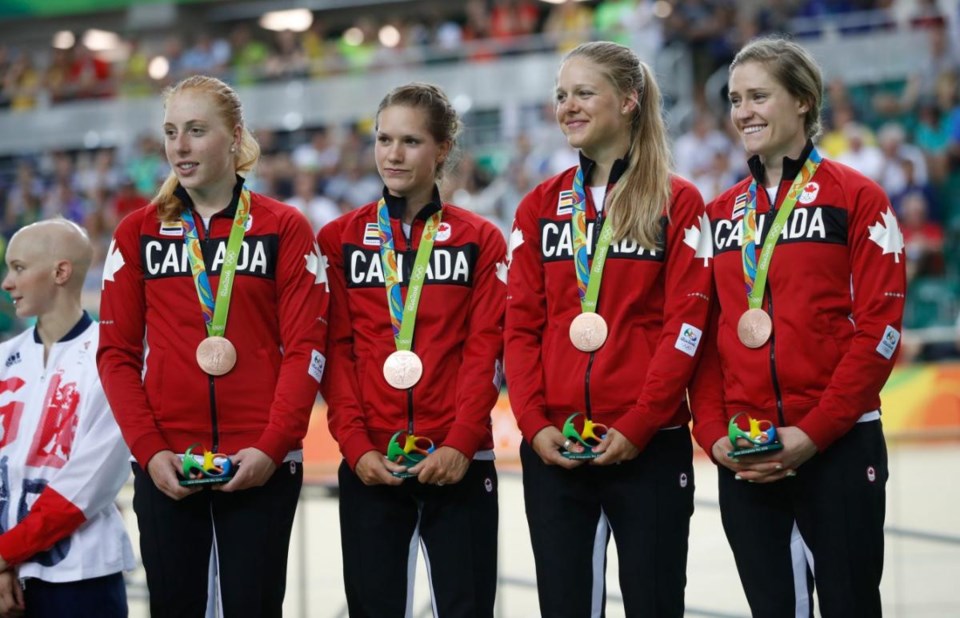
The podium showing ended an epic Olympic medal chase that began when Simmerling was just 20 years old competing on the deviously icy alpine courses in Whistler in 2010. Her wild athletic ride also included quick recoveries from several scary injuries, including a ski cross crash in 2012 that left her with three broken vertebrae. She spent seven weeks in a body brace recovering, but just one year later earned her first ski cross World Cup medal. Two years after breaking her back, she tried cycling on a velodrome track for the first time in her life. And two years after that she became an Olympic medallist.
“She got told ‘no, no, no,’ multiple times, to go away or whatever else, and she wouldn’t listen to it,” said Richard Wooles, a North Vancouver-based elite cycling coach who was there when Simmerling took her first tentative turns around a velodrome track. “It’s a remarkable story. … For an outsider from a different discipline – and not even a summer sport, she was a winter sport athlete – it’s a little crazy.”
This story is far from over though. Simmerling ditched the bike after Rio and got right back on snow. It didn’t take her long to reinject the ice into her veins either – last week she hit the podium at a ski cross World Cup race in Innichen, Italy. The bronze was her first ski medal since the switch to cycling, and sixth overall.
Wherever her career takes her now, you know that Simmerling will get there fast.
• • •
Simmerling wasn’t the only North Shore athlete to hit the podium in Rio, as West Vancouver swimmer Emily Overholt scored bronze in the 4x200-metre freestyle relay.
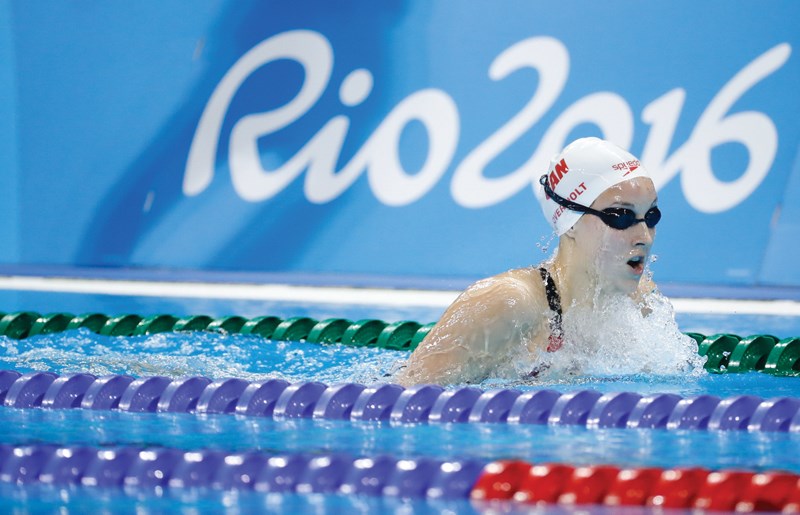
The teenage swimmer thought her Olympics were done after swimming two individual events on the first two days of competition, but was called back into action on short notice to replace an ill teammate in qualification in the relay. She didn’t swim the final or get to stand on the podium, but Overholt got her first bit of hardware in what has the potential to be a long and lucrative Olympic career.
2. Robbins races world’s toughest run
It’s may seem a bit strange that our No. 2 story of the year is about a man who took part in a race but didn’t even reach the finish line, but here we are.
To be fair though, The Barkley Marathons, tackled in 2016 by North Vancouver ultra-runner Gary Robbins, is not your typical race: 60 hours straight running more than 100 miles through leg-shredding terrain in Tennessee’s Frozen Head State Park. It’s a five-loop race, and for most entrants the ultimate goal is to complete just one loop.
Robbins, running it for the first time, survived 4.5 loops. It’s the farthest any Canadian has ever made it in the race, and the third farthest for any race rookie.
The race has reached near legendary status in the ultra-running world and is known by many as the toughest footrace on earth. Each year, 40 hand-picked participants attempt to tackle five loops of a course that is at least 20 miles (32 kilometres) long, although runners swear it is closer to the 26 miles of an actual marathon. The course rises and falls through the rounded Tennessee mountains, racking up cumulative elevation gains and drops that are roughly equivalent to climbing and descending Mount Everest. Twice.
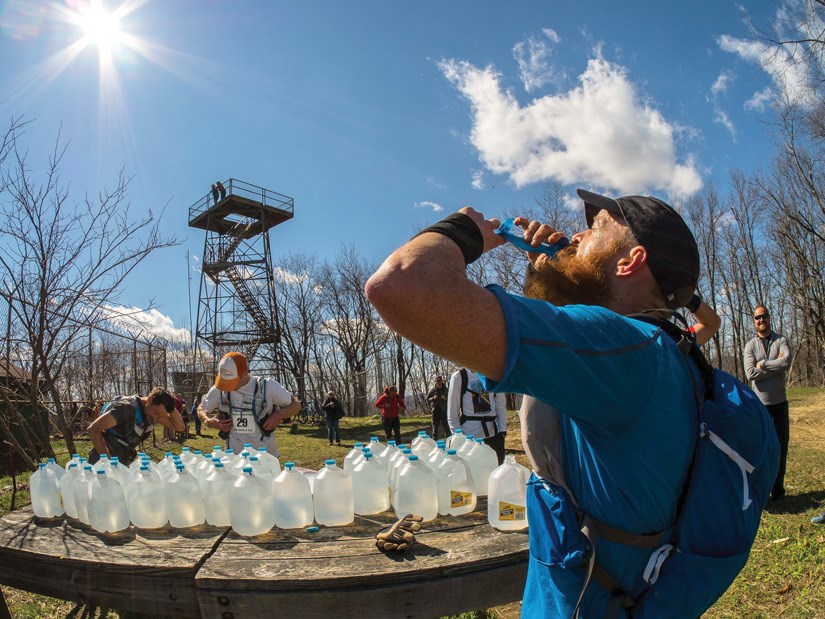
In the 30 years since the race was created, 14 humans have finished all five loops in the allotted 60 hours. The event is known for its numerous quirks. The race can begin anytime from 11 p.m. to 11 a.m. on race day, with event creator Gary Cantrell, a.k.a. Lazarus Lake blowing a conch to let racers know the race will begin in one hour. The start is then signalled by Lake lighting a cigarette.
The course is not marked – one map is provided to all the runners the night before the race. There are few aid stations along the course and racers mark their progress by finding books along the way and tearing out pages corresponding to their bib number.
“The only comparable I can think of is if you were to go up on our North Shore mountains and ignore all of the trails, and then draw lines across the mountains that included the steepest ravines you could imagine,” Robbins said after taking on the race.
It was near the end of Loop 3 and the start of Loop 4 that the reality of racing for 100 miles without any sleep started to catch up to Robbins. That’s when the hallucinations began.
“Your brain just starts creating faces all over the place in the leaves on the ground,” he said. “I hallucinated my brother’s face on a pebble.”
Midway through lap five Robbins made a wrong turn and got lost in the dark, his race ruined as he spent more than two hours looking for a book. Knowing he’d never finish before time ran out, he caught a ride back to the finish line where he received the final insult bestowed upon all who fail to complete the five laps: a bugler playing “Taps.”
It was “incredibly disappointing,” said Robbins. “One of the more disappointing things of my racing career.”
He soon, however, realized the magnitude of his feat, coming oh so close to finishing the world’s toughest race.
“I didn’t have enough of an appreciation before for how few people get to the fifth lap and how celebrated that is in and of itself,” he said. “I still have waves of knowing that I was that close and wishing that I had pulled it off. By and large I am really happy with what I was able to pull away from that race. I can’t stop thinking about it, so I definitely will be returning to eventually – no matter how long it takes – be the 15th finisher of The Barkley.”
3. Jones nearly steals Stanley for Sharks
From our viewpoint, North Vancouver’s Martin Jones has always felt a little bit like the Rodney Dangerfield of the goaltending world – he just can’t get no respect.
Coming out of the North Shore Winter Club where he won nearly every game he played, Jones ended up in the WHL with the Calgary Hitmen but was stuck on the bench as a backup at the start of his career. When he did earn the No. 1 job he racked up impressive numbers that eventually earned him the WHL goaltender of the year award, yet when he reached his NHL draft year all 30 teams passed on him. He then signed with the Los Angeles Kings and continued to shine at every level he played, but when he did reach the NHL for good he was mostly stuck on the bench as a backup to superstar Jonathan Quick. Jones did win a Stanley Cup with the Kings but it was as a backup, and he only saw mop-up duty in two of the team’s playoff games.
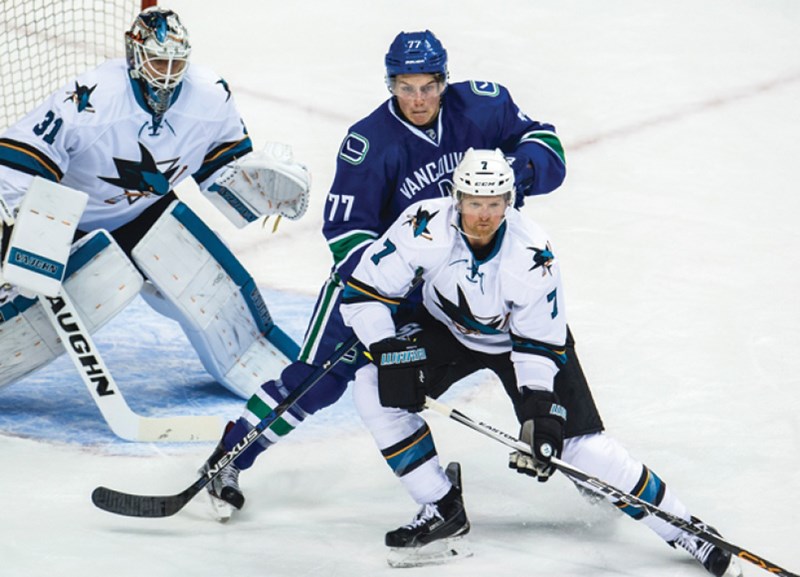
The 2015-16 season, however, was the year that everything finally fell into place, as Jones earned his respect and very nearly the first Stanley Cup in the history of the San Jose Sharks franchise. The Sharks traded for Jones before the season and made him the starter. He didn’t disappoint, continuing to do what he’d always done: stop hockey pucks at an elite rate. His play reached a new level in the playoffs as Jones led the Sharks – long known as a strong team that suffered spectacular playoff flame-outs – to the Stanley Cup final for the first time in team history.
The Sharks didn’t win, losing in six games to Sidney Crosby and the Pittsburgh Penguins, but Jones was spectacular, putting together a playoff goals-against average of 2.16 and a save percentage of .923. He’s kept it up this season, leading the Sharks to the best record in the Pacific Division while ranking third in the league in wins, eighth in goals-against average and tied for eighth in shutouts.
“When he’s given an opportunity, he excels,” his former North Shore Winter Club coach, Billy Coupland, told the North Shore News. “I see no reason why he isn’t going to continue to excel because quite frankly at every stage he’s done just that. There’s never been anything that’s ever been handed to him. In every situation it’s always been something that he’s had to work for. It’s one of those unique stories and a really cool story.”
The secret is now out – Martin Jones is a star.
4. Blues bronzed at soccer nationals
The Capilano University men’s soccer team makes this list for the second year in a row as they once again proved themselves to be one of the best programs in the country.
The Blues were dominant in PacWest play, capping off an undefeated regular season with a pair of emphatic wins at the provincial tournament. Their 4-2 win over Douglas College gave them their second straight PacWest title, the first time they’ve won back-to-back provincial crowns since Capilano claimed four straight from 1988 to 1991.
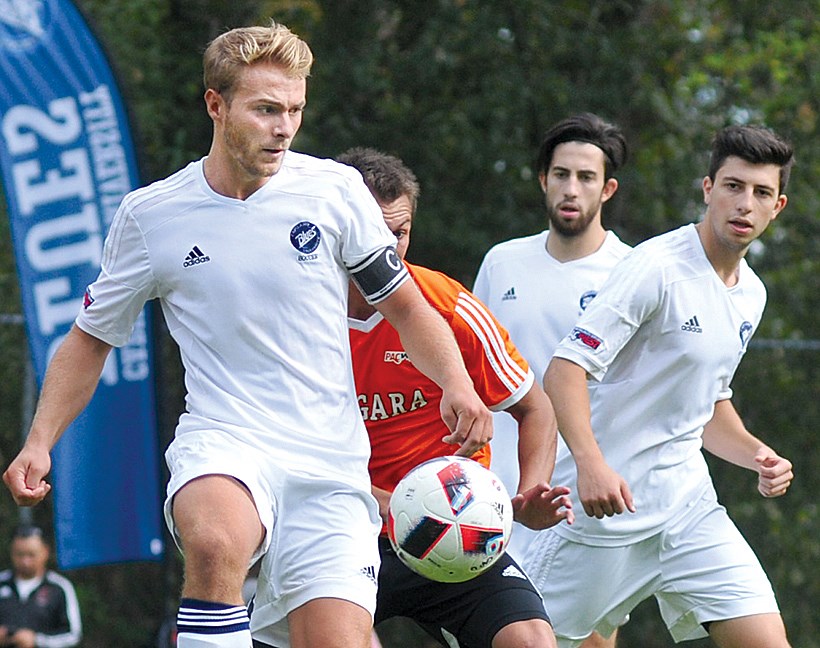
Following provincials it was on to the national championships in Fort McMurray where the Blues fell one step shy of their ultimate goal. Capilano claimed bronze, beating the Algonquin Thunder 3-2 in the consolation final. Their only loss of the season, however, came at a most inopportune time as the host Keyano Huskies beat the Blues 3-1 in the semifinals to end Capilano’s claim for a national title.
“The guys had an incredible season,” said head coach Paul Dailly, who was named the national coach of the year. “To go 15 wins, one loss, two ties on your year, and your only loss costing you a berth in the gold medal game, you can’t really fault them for that.”
The Blues came home with some individual awards as well, with super striker Keith Jackson – the PacWest’s leading scorer with 11 goals in 12 games – earning all-Canadian status for his stellar season. Fourth-year defender Nicolas Morello earned a spot on the national championship all-star team, an award that followed his MVP showing at the provincial tournament in late October.
The Blues also said goodbye to captain Devan Woolley, a hard-hitting player who spent five years shoring up the defence for the Blues.
“The (team) wanted to reward their fifth-year captain with at least a medal,” Dailly said. “Obviously it wasn’t the colour we were looking for – we definitely wanted to be in that gold medal match – but I’m just happy they responded the way they did and were able to get that bronze.”
That’s two straight national medals for the Blues, who scored CCAA silver in 2015. Next year, no doubt, they’ll be looking to complete the trio with the final golden piece.
5. Artley scores a hat trick of championships
No. 5 on our list goes to a high school student who crammed a lot of championships into a very small time frame.
Collingwood Grade 12 student Brendan Artley came away with three provincial titles in the span of just a few months, starring on the school’s basketball and tennis teams while also sticking it to the rest of the field in javelin at the B.C. track and field championships.
On top of being an elite athlete, Artley is also a coach’s dream, said Collingwood athletic director Dave Speirs.
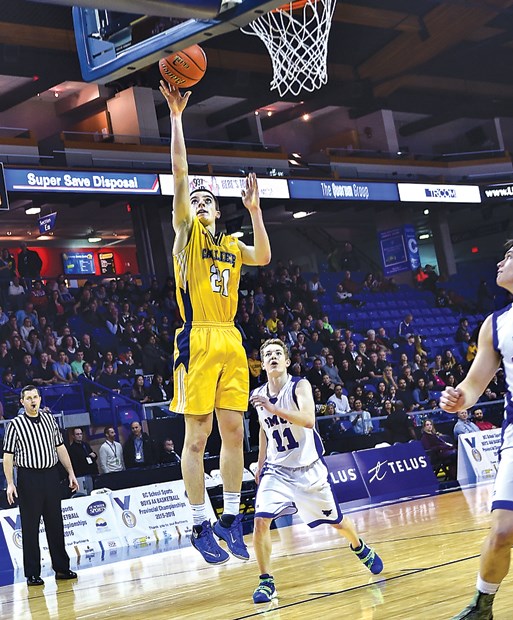
“The most impressive thing about Brendan is his humility,” said Speirs. “What a great kid. Every coach raves about him here at Collingwood.”
Artley was born in England and moved to Canada with his family in Grade 2 and has been at Collingwood ever since. He actually starred in a fourth sport last season, his English roots showing as he was co-captain and co-MVP of the Collingwood soccer team.
The Cavs fell short of provincials on the soccer pitch but claimed a historic win on the basketball court, with Artley on board as a starting forward. Artley’s humility showed as he described his role on the squad.
“I didn’t have much talent, I just kind of tried really hard which was why they put me on, I guess,” he said. A high school growth spurt pushed Artley to his current height of six-foot-three, which combined with his athleticism made him an intimidating presence for the Cavaliers on defence. He also had another roll on the team: hype man. During warmups Artley could be counted on to throw down some ferocious dunks – his repertoire included a full 360 spin – to fire up his teammates and the crowd.
The tennis title and track and field crown were earned on back-to-back weekends, with Artley artfully juggling the two sports during the spring semester. When asked about his tennis prowess, Artley against passed the credit on to his teammates. He and partner Liam Huebner went undefeated all season in boys doubles.
“Creds to Liam – he’s the talent on the team,” he said, adding that the game plan was always to get himself to the net to put up a big wall, while Huebner chased everything else down on the baseline. “(Liam) was consistent, all game, every game. He was the backbone of the team. When I’m at the net, even if it’s going out I’ll just hit it back.”
Javelin is Artley’s main game, and his pointed attack landed him a scholarship on the track team at NCAA Div. 1 school North Dakota State this year. At the North Shore championships last spring he set a personal best and smashed a 35-year-old North Shore record with a throw of 64.66 metres, following that performance up with a win at provincials.
“I’ve always loved sports, since I was young,” Artley told the North Shore News in trying to explain his hat trick season. “I’ve been taught by various coaches to try hard. That’s the main thing that I focus on, putting in my best effort. That’s helped me get better.”
Honourable mentions
■ Swimmer Nathan Clement makes final, sets new Canadian record at Paralympic Games.
■ Jane Channell wins silver at World Cup skeleton race.
■ Argyle’s Georgia Swant scores 44 as Pipers win junior girls provincial basketball title.
■ Harry Jones and Adam Zaruba star in rugby sevens win at BC Place.
